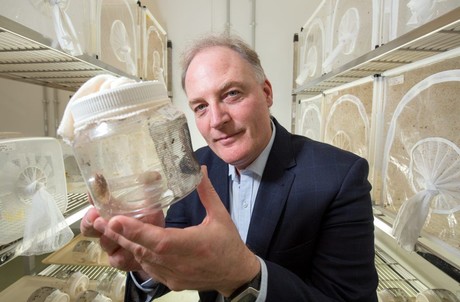Fruit flies beware

The Australian Research Council Centre for Fruit Fly Biosecurity Innovation has opened at Macquarie University. The centre is dedicated to providing sustainable and environmentally friendly tools for controlling fruit fly pests and training a new generation of insect biosecurity researchers.
Fruit flies are Australia’s most economically damaging insect pests, posing significant threats to Australia’s $8 billion per annum horticulture industries. Insecticides have been used for decades to protect fruit and vegetable crops, but these are now restricted due to concern about consumer and environmental health, leaving horticulture industries vulnerable.
The centre seeks to develop new approaches and tools to enable sustainable and safe control of these pest fruit flies and reduce industry reliance on hazardous synthetic insecticides.
“Fruit flies pose a serious risk to Australia’s horticultural sector, and sustained production of vulnerable crops will require new solutions for managing them,” said centre director Professor Phil Taylor.
“We need to find ways to control these pests without relying on synthetic insecticides, and without harming the environment or people.”
The centre’s research focuses on the following key areas:
- Finding out how fruit flies move in the environment to predict ‘hotspots’.
- Developing tools to accurately and rapidly identify fruit flies, enabling a faster response.
- Developing lures to attract flies to traps, isolating insecticides away from crops, people and non-target animals. This includes using lures based on pheromones used by fruit flies to find mates, and bacteria used to find food and hosts.
- Investigating the cues fruit flies avoid, including products produced by predators such as spiders and ants, as a starting point to develop ways to protect crops by repelling rather than killing fruit flies.
- Investigating the use of nematodes, fungi and bacteria for use in biopesticides for use against fruit flies. In particular, the team is investigating a bacteria passed from mother to offspring and that can make fruit flies unable to reproduce, controlling the population.
The centre will directly support the research and training of 10 PhD students and three Research Fellows in Insect Biosecurity, a discipline of great importance to sustainable production of fruit and vegetables in Australia, as well as protecting Australia’s borders from invasive species.
Originally published here.
Expanding beyond biscuits: Arnott's acquires Prolife Foods
The Arnott's Group has expanded its 'better-for-you' snacking portfolio with the...
FDA investigates PFAS in seafood
The US Food and Drug Administration (FDA) expands its investigation on per- and polyfluoroalkyl...
Cell-cultured quail moving closer to Australians' plates
FSANZ is undertaking a second round of consultation on a proposed approach to allow cell-cultured...














